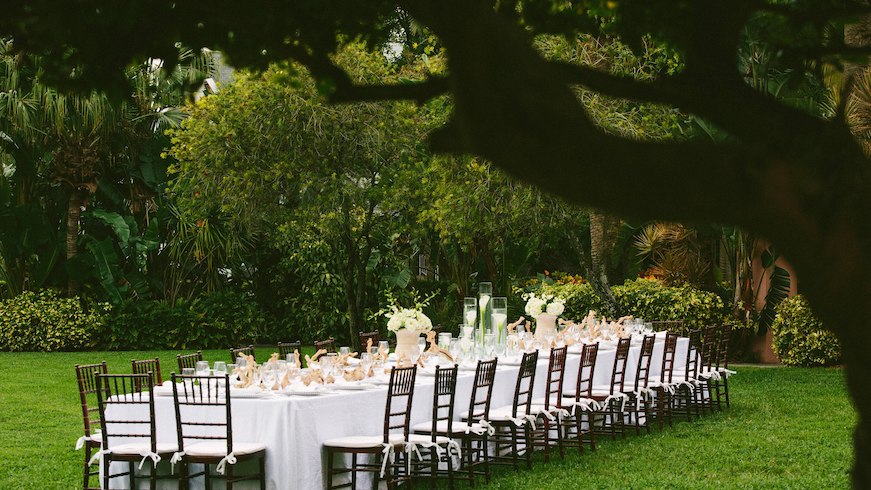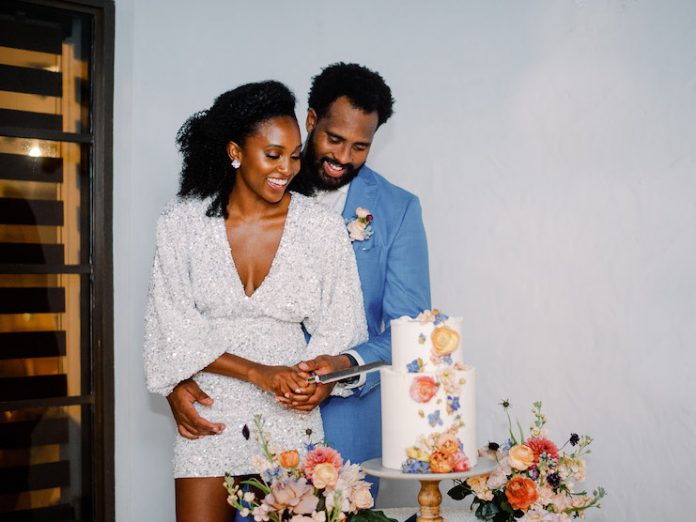Over the past year, the COVID-19 pandemic forced couples to cancel, postpone, and reimagine their wedding plans. For hotel teams, this new reality presented significant challenges as staff adjusted their approach to comply with local regulations, social distancing protocols, and enhanced standards of cleanliness, all while navigating guest cancellations and rebookings. Today, as the COVID-19 vaccine rollout continues nationwide, hotels are beginning to see an uptick in wedding bookings, particularly requests for dates that are just a few months and sometimes even weeks out compared to traditional lead-times of a year or more in advance. LODGING asked seven hotel sales leaders about the trends they’re seeing around last-minute weddings, how their teams are adapting, and their advice for accommodating these events.
Bookings Up, Windows Down
Katie Zeim, senior catering sales executive at The Vinoy Renaissance St. Petersburg Resort & Golf Club in Florida, said that the property’s wedding bookings began picking up in November. Zeim is seeing a mix of lead times and clients—both new and returning couples who postponed events over the past year. Zeim noted that some couples are drawn to the property’s location in a warm-weather state with fewer restrictions on gatherings and events compared to others. “We’ve had several bookings from couples in New York and Chicago that have no connection to Florida who are looking to move their weddings to a location with good weather for an outdoor event or to a state that is currently allowing dancing at weddings,” she explained, adding, “We’re seeing plenty of last-minute ‘elopements’ of local couples that want to get married in front of family and are planning to host something larger in a year. We’re also still receiving a strong amount of wedding leads for parties of 150 or more.”
Lanette Torres, director of group sales at The Confidante Miami Beach in Florida, has been seeing an influx of inquiries for weddings since the start of the year, particularly for requests of dates within a 30-day window. “From beach weddings to outdoor ceremonies, couples are looking for uncomplicated ways to celebrate with minimal planning,” Torres explained. “Most of the last-minute wedding events are micro weddings with between 20-40 guests. These weddings vary from earlier in the day lunch events to early evening gatherings with shorter receptions and a greater focus on their dinner service. Couples are looking for one-of-a-kind, more intimate settings, which leads to simpler celebrations that can be planned in less time.”
Nikki Stewart, director of sales at The Foundry Hotel, a Curio Collection by Hilton property in Asheville, N.C., also started seeing more wedding booking requests in 2021 from both new and returning clients, some of whom have already eloped and are looking to celebrate with friends and close family. “They came in at much higher levels than originally expected,” Stewart said of the influx in booking requests at the start of the year. “Typically, we would book weddings no less than a year out, but this year was very different—in 24 days alone (January) we booked as much group room revenue as we had lost in Q2 and Q3 of last year,” she explained. “The planning windows are certainly shorter this year, but they are gradually getting longer, and I would expect them to be at 1-plus years again by early next year if not soon.” Stewart added that this year, The Foundry has already booked micro weddings to take place in April and May, giving couples around 60 days to plan. “In previous years, we might have had one micro-wedding or elopement booking whereas this year we have more than five.”

Jessica Bowman, area director of sales at HarbourView Inn, French Quarter Inn, and The Spectator Hotel in Charleston, S.C., is also seeing “a few more inquiries than usual for elopements” and short-term requests compared to 2019, mostly for dates between three and six months out. “We have seen more of an interest in elopements/micro weddings since the pandemic at both HarbourView and French Quarter Inn. We are hosting a private event in The Bar at The Spectator Hotel after a couples’ rehearsal dinner this coming May.”
Outside the United States at Banyan Tree Cabo Marqués in Acapulco, Mexico, Elena Barrientos, sales executive for destination weddings and events, said that inquiries have been coming in since the property’s reopening in July 2020 and the first booking was in September. Lately, the booking windows have been shorter than average, and the majority of recent bookings have been for micro weddings, with 85 percent under 50 attendees and the other 15 percent for events of between 50 and 200 guests. “In 2019, the average lead time was approximately four months, now the lead time is approximately 30 days. The split is approximately 50 percent in 30 days and the other 50 percent in approximately 90 days. We do have a couple of bookings with lead times longer than a year.”
For Curaçao Marriott Beach Resort, which opened in November 2019 just months before the Carribean island went into lockdown in March 2020, wedding bookings were slow to come back and those that have taken place in recent months have either been small, booked within a short window, or nontraditional, according to Mark Nooren, general manager. “Big weddings and traditional ones have decided to postpone their dates to 2022 and until further notice,” he explained.
Making Last-Minute Weddings Work
To determine if a property can host a last-minute wedding booking request, Bowman said a key consideration is how the event will impact guests. “Our space is strictly based on availability and if they can work within our preferred time slot throughout the day to not inconvenience other guests of the hotel,” Bowman explained. “Since our terraces at HarbourView Inn and French Quarter Inn are common areas of each hotel and desirable for our guests to enjoy, specifically during wine and cheese hour, we have to make sure we don’t encroach on this time. Additionally, at French Quarter Inn, the meeting space has to be available in conjunction with the terrace in case of inclement weather.”
Stewart said that because large group bookings at The Foundry Hotel have shifted to the latter part of the year and beyond, that has freed up space, allowing the hotel to accommodate last-minute weddings with as little as two weeks’ notice. “The most important factors when deciding if we can accommodate a last-minute booking request is if we can execute it successfully with the amount of notice given, and if it is the ‘right size’ fit for our property while occupancy restrictions are still in place,” Stewart explained.
While response time is always important, it is even more critical in instances of last-minute event bookings, Torres noted. “When guests are requesting to use meeting rooms last minute, there is no time to waste. Meeting spaces must always be ready to use, clean and sanitized, and set for meetings. Pricing and booking process must be seamless and easy for guests. Additional needs such as food and beverage and AV should be confirmed at initial communication to ensure their meeting is set up for success.”
Moreno echoed the need for flexibility and preparedness. “As soon as the couple is ready, we are ready,” she said. “Our team has learned to work with faster turnaround times than usual. We needed to adapt to the new trends and have been able to accommodate all of those looking for a place to get married or relocate their events.”

In addition to flexibility, Zeim said creativity is important in today’s environment. “Be flexible and open to ideas, and understand what your staff can and cannot do in a short timeframe,” Zeim advised. She also recommended offering examples of recent weddings and visuals of set-ups so that couples can see what events look like in today’s environment.
Barrientos said Banyan Tree Cabo Marqués can accommodate a wedding within a week. “Some of the factors that are important in a quick decision include the menu, our occupancy rate, and the availability of external providers. For example, an exotic menu takes longer, a larger party needs more rooms, and the availability of a decorator, DJ, or photographer would be obstacles to overcome for a short lead time,” she explained. “We have learned to overcome some of these obstacles by offering a simple menu, having more employees on call, and a new, easier payment system.”
Mark Nooren said 10 days’ notice for last-minute weddings gives the team at Curaçao Marriott Beach Resort enough time to consider factors such as staffing, food and beverage orders, event locations, room availability, and decorations, among others. “We understand that it is hard to plan ahead with constant changes happening around us. We take every opportunity we can and do our best to accommodate a last-minute booking,” he explained, adding that planning a wedding in a short-time period is stressful for the couple, too. “We are here to offer them the best experience possible considering these hard times. Every effort and hard work we put it into eventually pays off and it is so rewarding to see it all play out at the end of the day.”
Going Forward
When asked about their biggest takeaways from the past year, these hotel sales leaders stressed the importance of safety, transparency, flexibility, creativity, and—perhaps most of all—empathy.
“The hotel industry is evolving constantly; however, this past year has really taught me to be more innovative, think more outside of the box, and advance certain technologies and programs/trainings to better provide for our guests in these difficult times,” Nooren said. “It has taught us to be more flexible and bend the rules a little bit just to maintain a good relationship, but to also be understanding of the environment and the world we live in now.”
“I’ve learned that being transparent, honest, understanding, flexible, and truly wanting to work and help people—even during a time of a crisis—will lead to loyal and genuinely built relationships,” Stewart said. “While it has been challenging at times to accommodate last-minute operational requests for such bookings, we are all just glad to be busy again and also excited about the return of groups and hopefully some sense of ‘normalcy’ in the near future.”











